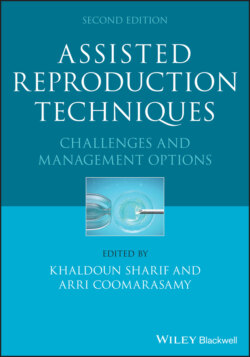Читать книгу Assisted Reproduction Techniques - Группа авторов - Страница 122
Hyperthyroidism
ОглавлениеOver 90% of hyperthyroidism in pregnancy is secondary to Graves’ disease. In this condition, TSH receptor antibodies stimulate the thyroid gland resulting in elevated free T4 and free T3 concentrations in the circulation, which suppress TSH production by the pituitary gland. Uncontrolled maternal thyrotoxicosis is associated with many complications in pregnancy (Table 13.2). The transplacental passage of TSH receptor antibodies may cause fetal or neonatal hyperthyroidism in less than 1% of cases while anti‐thyroid drugs can induce fetal hypothyroidism.
There has been an unproven causal link between carbimazole (CBZ) or methimazole (MMI) and the rare benign scalp condition of aplasia cutis, esophageal atresia, choanal atresia and dysmorphic facial features in the fetus [13]. Associations of CBZ/MMI with other congenital anomalies involving the musculoskeletal, urinary, cardiovascular and respiratory systems have also been described [14]. Similarly, propylthiouracil (PTU) has also been associated with mainly head/neck and urinary anomalies, with overall a slightly lower teratogenic risk than CBZ/MMI. Compared with the unexposed, offspring exposed to either drug had around 1.5 times the risk of having a congenital anomaly [14]. Both drugs show no significant differences in their potential to induce fetal hypothyroidism [15]. The evaluation of children exposed to either drug also showed no difference in neurodevelopmental assessments compared to unexposed siblings [16]. Hence PTU is currently favored over carbimazole/MMI in women planning a pregnancy. Because PTU is associated with the rare side effect of severe liver impairment (1:10,000), some have advocated converting treatment back to carbimazole in the second and third trimesters.
Table 13.2 Complications associated with uncontrolled maternal thyrotoxicosis [22]
| Thyroid storm (first and second trimesters) Maternal congestive cardiac failure Preeclmpsia Placental abruption Preterm delivery | Miscarriage Fetal growth restriction Fetal thyrotoxicosis Fetal hypothyroidism Stillbirth Perinatal death |
